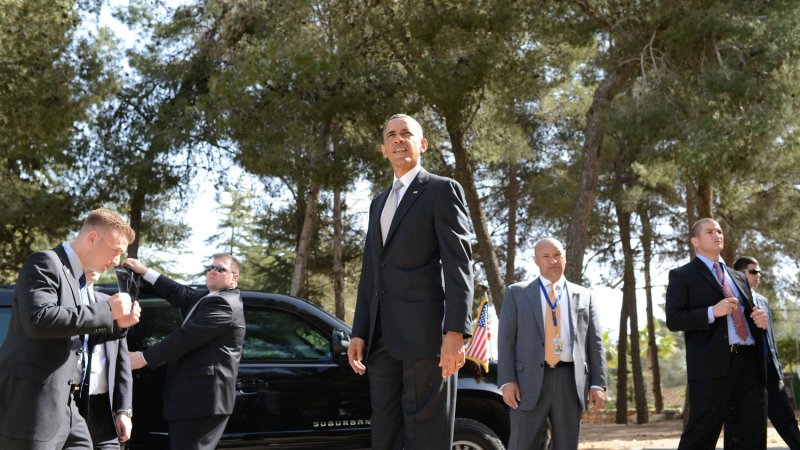1 of 6 | U.S. President Barack Obama pauses as the Secret Service provides security during a visit to Mount Herzl on the west side of Jerusalem, Israel on March 22, 2013. Mount Herzl is Israel's national cemetery and is named after Theodor Herzl, who was the founder of the modern Zionist movement. Obama is in the final day of his three-day visit to Israel and the Palestinian Territories. UPI/Kobi Gideon/GPO |
License Photo
TEL AVIV, Israel, March 21 (UPI) -- Heavy fighting was reported between Syrian government and rebel forces on the disputed Golan Heights on Israel's northern border as U.S. President Barack Obama visited the Jewish state.
The clashes suggested that a major battle may be developing in southern Syria between some 1,000 rebels and government troops.
Initial reports say the regime forces include the 4th Armored Division, one of Assad's elite and most loyal units, which is commanded by his younger brother, Maher.
The fighting has heightened concerns the Islamist groups are seeking to control the region south of Damascus to open a new front in their 2-year-old war against the regime of President Bashar Assad.
But if these groups, some linked to al-Qaida, wrest control of the 3,000-foot strategic plateau, which dominates much of Israel's northern Galilee, it would put jihadist forces in large numbers in direct confrontation with Israel's military.
To be sure, there are jihadist groups in the Hamas-ruled Gaza Strip and in the Sinai Peninsula, where Egypt has largely lost all control since the February 2011 overthrow of longtime dictator Hosni Mubarak. But these would be much smaller security threats than forces deployed across the Golan, which Israel captured from Syria in the 1967 Middle East war and annexed in 1981.
And now there is another, and possibly greater, point of conflict: the Israeli government last month opened the two-thirds of the volcanic plateau it controls to oil exploration.
On Feb. 20, a month before Obama was to visit, the Israeli Ministry of Energy disclosed it had awarded the first drilling license to drill to an Israeli subsidiary of Genie Energy of New Jersey, a U.S.-Israeli company.
The settler-run company's business in Israel is headed by former infrastructure minister Effie Eitam, a right-wing, hard-liner and retired brigadier general who lives in a Jewish settlement on the Golan.
Some analysts saw the move by Israeli Minister of Water and Energy Resources Uzi Landau, an ultra-nationalist, as a message that the Jewish state won't easily relinquish the Golan.
The timing, as Assad fights for survival, "is directly related to the fact that the Syrian government is not free to deal with this problem and that the Syrian army cannot pose a threat to Israel right now," Israeli political analyst Yaron Ezrahi observed at the time.
"This is mostly an Israeli ploy to deepen its commitment to the occupied Golan. It's part of the right's political program."
Israel's oil exploration program may not deter future negotiations with Syria but it's likely to stir up tensions.
If oil or gas is discovered in the Golan it could seriously jeopardize the territory's return to Syria.
There has been sporadic fighting across the Syrian sector of the Golan for weeks but the apparent move to outflank regime forces around the town of Khan Sheikh, about 4 miles from the southern outskirts of Damascus.
On Wednesday evening, rebel spokesmen said their forces had attacked a regime mortar base on the southern slopes of Mount Hermon, the highest peak in the region.
The Israeli army has a high-tech electronic surveillance base on top of the 9,230-foot mountain in an Anti-Lebanon range which straddles the Syria-Lebanese border and overlooks Damascus.
The Israelis can be expected to heavily defend such a prized installation if it's threatened.
The Islamists has sworn to liberate Jerusalem but it's most unlikely the Islamist rebels are seeking to pick a fight with Israel right now while they focus their operations in the region on weakening the regime's position south of the capital.
Rebel forces there are struggling to push into the heart of the Assad regime.
Unconfirmed reports indicate the rebels killed the commander of the Syrians' 90th Brigade, Brig. Gen. Nouredine Habib in an ambush when they launched their Golan offensive March 12.
Also reported killed was Col. Radwan Rifai, chief liaison officer with the Syrian 3rd Division.
Clashes were also reported around the largely deserted Golan capital of Quneitra, near the cease-fire line established at the end of the 1973 Middle East war, when the Syrians came within an ace of driving the Israelis off the plateau.
If the Islamists take over Quneitra and its environs, their fighters will be within shooting distance of Israel's occupation troops.





